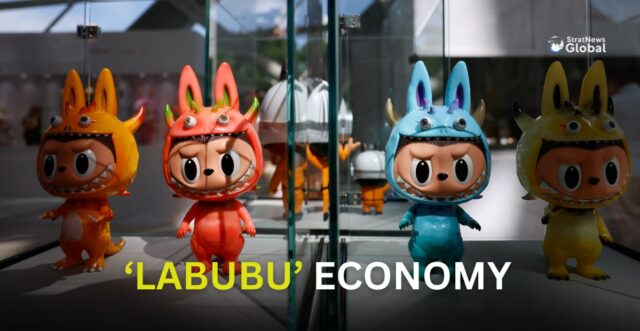They are soft, slightly rounded tubby figures ranging in size from three inches to 31 inches or a little over two feet. With wide eyes, pointy ears and nine sharp teeth, they have taken China by storm, the makers cashing in on “emotional consumption” as the country’s economy undergoes a shift away from real estate.
But what are they exactly? These are Labubu dolls, characters originally drawn from Nordic folklore but suitably “sinicized” to form part of a story series for children. Each doll represents a character with funny names like Mokoko, Spooky, Tycoco and Zimomo and they don’t come cheap: from $15 for a 3-inch figure to $950 for a 31-inch “mega” figure.
Labubu dolls are selling faster than ever with celebrities spotted carrying handbags with the dolls attached. A Labubu even “graduated” from Tsinghua University, with netizens humorously calling it “the most highly educated Labubu in the world!”
The Labubu is about experience, self-expression and of course emotional comfort with a life-size doll going for as much as $170,000 at a recent Beijing auction.
The Labubus are made by Chinese firm Pop Mart which is banking on the “blind box” model to sell its product: meaning buyers do not know which Labubu doll they have bought. It adds to the excitment, expectation and suspense and apparently, has led to repeat purchases.
The “blind box” model is especially powerful among China’s Gen Z and millennial consumers, who face intense academic and career pressures, rising cost of living, and uncertain futures. The “Blindbox economy” operates on the ‘probability trap’, igniting a ‘completion compulsion’ among collectors, is the word from market analysts.
Labubu also represents a broader Chinese ambition to build homegrown IP (intellectual property) that can rival global giants like Disney. In 2024, Pop Mart’s ‘The Monsters’ line, featuring Labubu, saw revenue jump over 720% to 3 billion yuan.
Pop Mart is expanding into Japan, Southeast Asia, and even Europe, using characters like Labubu as soft power exports. It has recently announced a collaboration with the famous Japanese fashion and clothing company, UNIQLO. This aligns with China’s long-term goals of building cultural influence alongside economic might.
Although the Labubu frenzy has surged in the past year, with social media flooded with the videos of unboxing and revealing the doll, the bubble might burst soon as second hand price falls.
However, with a small doll, China is redefining its economy and analysts believe that emotional consumption and blind box marketing will continue to play a crucial role in stimulating domestic demand, especially in a consumer market seeking new, less conventional drivers.





